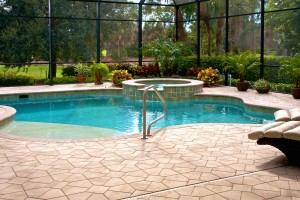Energy Efficiency
Learn about the benefits for solar pool heating and see if a solar pool heater is the right option for you!
Learn about the benefits for solar pool heating and see if a solar pool heater is the right option for you!
Most adults and children love swimming. Swimming is not only a great form of low impact aerobic exercise, it also a great way to spend time with your family. Statistics show that the more you swim, the less stress you have, and the happier and healthier you are.
There are over 10.4 millions private pools and over 300,000 public pools in the U.S, but many of them only operate for the summer season. For pools that are open year round, many times the water may be too cold to swim in, thus energy may be used to heat it. Even when the outside temperature is 80 degrees, the water temperature is still well below a comfortable temperature and it takes significant time and energy to heat it up.
This is where solar pool heating can help keep you swimming and comfortable. For example, in the state of Florida, a pool equipped with a solar pool heater can extend the swim season to over 300 days a year of family fun and splashing in the sun.
 There are several types of pool heaters: electric pool heaters, gas pool heaters, heat pumps and solar pool heaters. An electric or gas pool heater is relatively inexpensive to purchase, but expensive to operate and not energy efficient. They also use electricity or gas which increases your carbon footprint, and in the case of gas pool heaters, increase air pollution. A heat pump has a relatively inexpensive monthly operating cost. However, it still uses electricity to transfer heat to the pool and is expensive to purchase. A solar pool heater has a more expensive initial investment, but has a number of advantages that can outweigh the initial cost.
There are several types of pool heaters: electric pool heaters, gas pool heaters, heat pumps and solar pool heaters. An electric or gas pool heater is relatively inexpensive to purchase, but expensive to operate and not energy efficient. They also use electricity or gas which increases your carbon footprint, and in the case of gas pool heaters, increase air pollution. A heat pump has a relatively inexpensive monthly operating cost. However, it still uses electricity to transfer heat to the pool and is expensive to purchase. A solar pool heater has a more expensive initial investment, but has a number of advantages that can outweigh the initial cost.
Solar energy helps the environment: Solar power is a renewable source of energy. A solar pool heater uses solar panels to transfer heat from the sun to your pool. Using solar pool heaters instead of electric pool heaters will reduce the use of fossil fuels, and in turn reduce the smog created by nitrogen dioxide released when burning fossil fuels. Using a solar pool heater instead of a gas pool heater will also reduce the carbon dioxide released to the atmosphere. This will help slow global warming and climate change for every installation.
Higher return on investment: A solar pool heater has a lifespan of 15 to 20 years or longer where an electric or gas pool heater has a lifespan of about 5 years. A solar pool heater also requires very little maintenance each year where an electric or gas heater requires yearly maintenance cost. The monthly operating cost of an electric or gas pool heater is between $300 and $600. A heat pump requires about $50 to $150 of monthly operating cost. For solar pool heaters, there is no additional monthly operating cost since the sun’s energy is a free renewable resource.
Energy efficient: A solar pool heater operates with the pump that you already have with your pool, therefore it is the most energy efficient option. The pump circulates the water to the solar collectors where it is warmed by the sun, then back to the pool. An electric or gas pool heater has a very low energy efficiency rating. A heat pump has a higher energy efficient rating as compared with the electric or gas pool heater, but still far lower than a solar pool heater.
Find options for solar pool heaters
Research shows that solar pool heating is one of the most cost effective way of using solar energy. According to EPA research, a solar pool heater usually cost about $3,000 to $4,000 to purchase and has a payback period between 1.5 to 7 years depending on the cost of fuel in your local area. After the payback period, your pool will be heated for free for 10 to 15 years and you can enjoy quality time with your family almost all year round. Installing a solar pool heater is a big investment decision, so evaluate your options and do your research carefully. If you live in a state with a lot of sunshine, a solar pool heater may be the best option for you, as well as for the Earth.